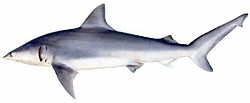Carcharhiniformes
| Ground sharks Temporal range: | |
|---|---|
 | |
| A finetooth shark, Carcharhinus isodon | |
| Scientific classification | |
| Domain: | Eukaryota |
| Kingdom: | Animalia |
| Phylum: | Chordata |
| Class: | Chondrichthyes |
| Subclass: | Elasmobranchii |
| Division: | Selachii |
| Superorder: | Galeomorphii |
| Order: | Carcharhiniformes Compagno, 1977 |

Carcharhiniformes /kɑːrkəˈraɪnɪfɔːrmiːz/, commonly known as ground sharks, are the largest order of sharks, with over 270 species. They include a number of common types, such as catsharks, swellsharks, and requiem sharks.
Members of this order are characterized by the presence of a nictitating membrane over the eye, two dorsal fins, an anal fin, and five gill slits.
The families in the order Carcharhiniformes are expected to be revised; recent DNA studies show that some of the conventional groups are not monophyletic.
The oldest members of the order appeared during the Middle-Late Jurassic, which have teeth and body forms that are morphologically similar to living catsharks.[1] Carchariniformes first underwent major diversification during the Late Cretaceous, initially as mostly small-sized forms, before radiating into medium and large body sizes during the Cenozoic.[2][3]
Families
[edit]Eschmeyer's Catalog of Fishes classifies the Carcharhiniformes into two suborders and nine families:[4]
- Suborder Scyliorhinoidei
- Family Scyliorhinidae Gill, 1862 (catsharks)
- Suborder Carcharhinoidei
- Family Atelomycteridae E. G. White, 1936 (coloured catsharks)
- Family Pentanchidae Smith, 1912 (deepwater catsharks)
- Family Dichichthyidae W. T. White, Stewart, Reuben O'Neill & Naylor, 2024 (bristle sharks)
- Family Pseudotriakidae Gill, 1893 (false catsharks)
- Family Proscylliidae Fowler, 1941 (finback catsharks)
- Family Leptochariidae Gray, 1851 (barbeled houndsharks)
- Family Triakidae Gray, 1851 (houndsharks)
- Subfamily Triakinae Gray, 1851 (smouth-hounds)
- Subfamily Galeorhininae Gill, 1862 (school sharks)
- Family Hemigaleidae J.C.F. Hasse, 1878 (weasel sharks)
- Family Carcharhinidae D. S. Jordan & Evermann, 1896 (requiem sharks)
- Family Galeocerdonidae Poey, 1875 (tiger sharks)
- Family Sphyrnidae Bonaparte, 1840 (hammerhead sharks)
Fossil genera
[edit]The following fossil genera of Carcharhiniformes are also known:[5]
- Genus †Altusmirus Fuchs, Engelbrecht, Lukeneder & Kriwet, 2017
- Genus †Corysodon Saint-Seine, 1949
- Genus †Platyrhizodon Guinot, Underwood, Cappetta & Ward, 2013
- Genus †Vectiscyllium Duffin & Batchelor, 2024
- Family Carcharhinidae
- Genus †Abdounia Cappetta, 1980
- Genus †Archaeogaleus Guinot, Cappetta & Adnet, 2014
- Genus †Danogaleus Noubhani & Cappetta, 1997
- Genus †Eogaleus Cappetta, 1975
- Genus †Eorhincodon Li, 1997
- Genus †Fornicatus Fuchs, Engelbrecht, Lukeneder & Kriwet, 2018
- Genus †Kruckowlamna Laurito Mora, 1999
- Genus †Misrichthys Case & Cappetta, 1990
- Genus †Pseudabdounia Ebersole, Cicimurri & Stringer, 2019
- Family †Florenceodontidae Cappetta, Morrison & Adnet, 2019
- Genus †Florenceodon Cappetta, Morrison & Adnet, 2019
- Family Hemigaleidae
- Genus †Moerigaleus Underwood & Ward, 2011
- Family Galeocerdonidae
- Genus †Physogaleus Cappetta, 1980
- Family †Pseudoscyliorhinidae Stumpf, Scheer & Kriwet, 2019
- Genus †Diprosopovenator Stumpf, Scheer & Kriwet, 2019
- Genus †Pseudoscyliorhinus Müller & Diedrich, 1991
- Family Pentanchidae
- Genus †Pseudoapristurus Pollerspöck & Straube, 2017
- Family Proscyllidae
- Genus †Praeproscyllium Underwood & Ward, 2004
- Family Scyliorhinidae
- Genus †Bavariscyllium Thies, 2005
- Genus †Cadiera Guinot, Cappetta & Adnet, 2014
- Genus †Casieria Noubhani & Cappetta, 1997
- Genus †Crassescyliorhinus Underwood & Ward, 2008
- Genus †Cretascyliorhinus Underwood & Mitchell, 1999
- Genus †Foumtizia Noubhani & Cappetta, 1997
- Genus †Megascyliorhinus Cappetta & Ward, 1977
- Genus †Microscyliorhinus Case, 1994
- Genus †Orthodon Coquand, 1860
- Genus †Pachyscyllium Reinecke, Moths, Grant & Breitkreuz, 2005
- Genus †Palaeoscyllium Wagner, 1857
- Genus †Platyrhizoscyllium Adnet, 2006
- Genus †Porodermoides Noubhani & Cappetta, 1997
- Genus †Premontreia Cappetta, 1992
- Genus †Prohaploblepharus Underwood & Ward, 2008
- Genus †Protoscyliorhinus Herman, 1977
- Genus †Pteroscyllium Cappetta, 1980
- Genus †Scyliorhinotheca Kiel, Peckmann & Simon, 2013
- Genus †Sigmoscyllium Guinot, Underwood, Cappetta & Ward, 2013
- Genus †Stenoscyllium Noubhani & Cappetta, 1997
- Genus †Thiesus Guinot, Cappetta & Adnet, 2014
- Genus †Tingaleus Cappetta, 1993
- Family Triakidae
- Genus †Archaeotriakis Case, 1978
- Genus †Gomphogaleus Adnet & Cappetta, 2008
- Genus †Kallodentis Engelbrecht, Mörs, Reguero & Kriwet, 2017
- Genus †Khouribgaleus Noubhani & Cappetta, 1997
- Genus †Meridiogaleus Engelbrecht, Mörs, Reguero & Kriwet, 2017
- Genus †Pachygaleus Cappetta, 1992
- Genus †Palaeogaleus Gurr, 1962
- Genus †Palaeotriakis Guinot, Underwood, Cappetta & Ward, 2013
- Genus †Rhaibodus Böhm, 1926
- Genus †Squatigaleus Cappetta, 1989
- Genus †Xystrogaleus Adnet, 2006
References
[edit]- ^ Stumpf, Sebastian; Scheer, Udo; Kriwet, Jürgen (2019-03-04). "A new genus and species of extinct ground shark, †Diprosopovenator hilperti, gen. et sp. nov. (Carcharhiniformes, †Pseudoscyliorhinidae, fam. nov.), from the Upper Cretaceous of Germany" (PDF). Journal of Vertebrate Paleontology. 39 (2): e1593185. Bibcode:2019JVPal..39E3185S. doi:10.1080/02724634.2019.1593185. ISSN 0272-4634. S2CID 155785248.
- ^ Condamine, Fabien L.; Romieu, Jules; Guinot, Guillaume (2019-10-08). "Climate cooling and clade competition likely drove the decline of lamniform sharks". Proceedings of the National Academy of Sciences. 116 (41): 20584–20590. Bibcode:2019PNAS..11620584C. doi:10.1073/pnas.1902693116. ISSN 0027-8424. PMC 6789557. PMID 31548392.
- ^ Brée, Baptiste; Condamine, Fabien L.; Guinot, Guillaume (2022-12-19). "Combining palaeontological and neontological data shows a delayed diversification burst of carcharhiniform sharks likely mediated by environmental change". Scientific Reports. 12 (1): 21906. Bibcode:2022NatSR..1221906B. doi:10.1038/s41598-022-26010-7. ISSN 2045-2322. PMC 9763247. PMID 36535995.
- ^ "Eschmeyer's Catalog of Fishes Classification". Eschmeyer's Catalog of Fishes. California Academy of Sciences. Retrieved 24 October 2024.
- ^ "Extinct - valid species | Species | Shark-References". shark-references.com. Retrieved 2024-03-06.
Further reading
[edit]- Froese, Rainer, and Daniel Pauly, eds. (2013) Fish Identification: Ground sharks in FishBase. March 2013 version.
- Sepkoski, Jack (2002). "A compendium of fossil marine animal genera". Bulletins of American Paleontology. 364: 560. Archived from the original on 2012-05-10. Retrieved 2011-05-17.


 French
French Deutsch
Deutsch